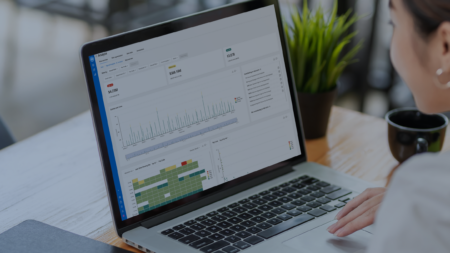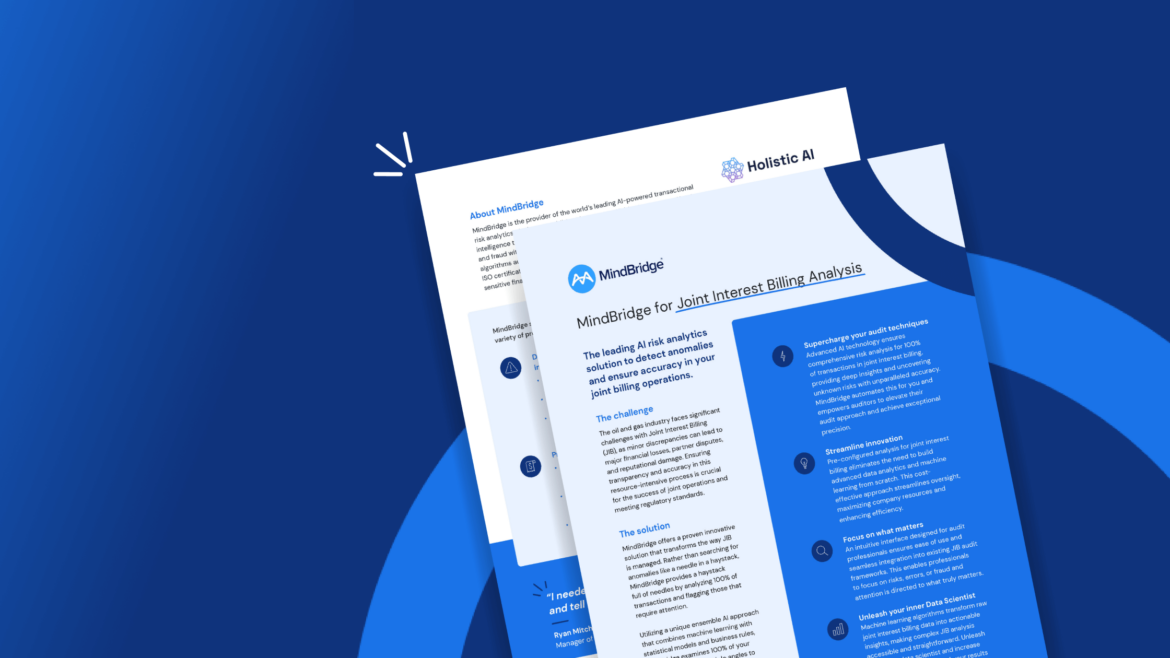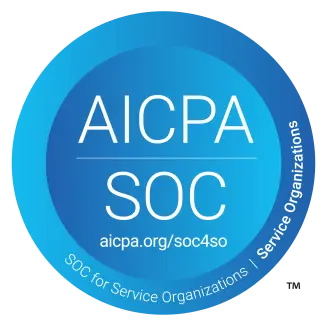Joint Interest Billing (JIB) is a financial process in the oil and gas industry that allows multiple parties in a joint venture to share costs. Because of the nature of their work, oil and gas companies often collaborate on things like exploration, development, and production projects. During these projects, each party takes a portion of the expenses based on their ownership interests. This is where JIB comes into play and ensures that all costs related to labor, equipment, materials, or operations are fairly distributed among stakeholders.
Traditional methods of JIB involve manual data entry and complex spreadsheets, which can pose serious challenges for those involved and lead to errors, delayed payments, and disputes among partners. When that happens, you’ll have to waste a lot of time and resources correcting mistakes and reconciling expenses. AI technologies come as a breath of fresh air, as they can simplify the processes behind JIB and reduce the risk of human error. While there are data privacy & security considerations for AI in finance, when used correctly, these technologies can automate tasks like data entry and analysis, enhancing accuracy, trust, and transparency.
Understanding Joint Operating Agreements (JOA) in Oil & Gas
A Joint Operating Agreement (JOA) is a legal contract that governs the relationships, rights, and responsibilities of the various stakeholders involved in a joint venture. In the oil and gas industry, this agreement is foundational for ensuring the fair and transparent management of operations, expenses, and revenues among parties.
Typically, a JOA involves two main types of players: an “operator” and one or more “non-operators.” The operator is responsible for managing the project.
They usually have the largest investment, so they will make the most important decisions related to the site and manage the upfront expenses. Operators must process the JIBs, usually every month, as part of their accounts payable workflow.
The non-operators invest in a project but don’t manage the day-to-day operations. They contribute capital and share the profits according to their ownership interest but don’t have a say in the operational decisions or the project’s workflow.
Despite having a more passive role in the project, non-operators can request reviews on the project’s performance, billing, and compliance with the joint operating agreement.
Oil and gas ventures involve high financial and operational complexities, and understanding the JOA is critical for all stakeholders. Transparency is also essential for ensuring compliance with the agreement and industry regulations and standards. Any lack of clarity can lead to serious mistakes and misunderstandings, which can delay the project or compromise its success altogether.
The large volume of data, multiple parties involved, and the diverse expense categories increase the risk of errors appearing in the JOA. Given the complexity and sensitivity of the data involved, identifying anomalies early while creating the JOA is critical for all stakeholders. The smallest mistakes can lead to disputes between partners and financial loss and can compromise the project as a whole.
The inconsistent data sources and the risk of human error make it easy to see how anomaly detection helps you stay ahead and avoid issues after the project has started. A JOA with no inconsistencies, transparency, and agreement by everyone is a crucial step before entering into a JIB.
Streamlining JIB Processes with MindBridge’s AI Solutions
A joint interest billing statement is a must-have for most companies in the oil and gas industry, but not the easiest one to create. Large volumes of sensitive data and multiple parties involved make the process extremely challenging.
MindBridge’s AI-powered platform streamlines the JIB process, making it easier for oil and gas companies to manage their finances with increased accuracy and efficiency. By automating processes like data analysis, our solution provides valuable insights and transforms how you manage financial reporting.
And if you’re wondering how to advance financial reporting with AI, watch our webinar to find all the answers.
How To Prepare a Joint Interest Billing Statement
The first step when preparing a joint interest billing statement is collecting all the right data. MindBridge supports various data formats, making the process seamless regardless of how many data sources you have.
The platform connects with your existing systems and data sources, extracting data directly, so you don’t have to worry about whether the information you’re gathering is complete or correct.
With pre-configured AI analysis tools created with the oil and gas industry in mind, you can categorize expenses and allocate costs according to your JOA statement, streamlining what would otherwise be a labor-intensive task.
Once you’ve imported and processed your data, MindBridge will show you insights based on the patterns and anomalies it finds. These help you pinpoint discrepancies so that you can address the issues before they become problematic.
How To Review & Approve A Joint Interest Billing Statement
Once you’ve imported all your data and created the JIB statement, it is time to review and approve it. MindBridge’s AI-powered solution highlights transactions that need closer scrutiny, such as flagged expenses or inconsistencies with the JOA. In this way, operators can ensure all transactions will be compliant with the agreement.
Next, the AI system can cross-reference working interest percentages and production volumes with the data in the JOA. This automatically verifies accuracy and reduces the potential for human error.
Last but not least, you’ll need to review and address any discrepancies within invoices, a process that MindBridge can speed up significantly thanks to its AI analysis.
How To Make Billing Adjustments & Corrections
When you identify billing mistakes, you’ll need to act quickly to correct them. For instance, you can start by looking for any duplicate billings. MindBridge’s AI automates this process, finding even those duplicates that you may have overlooked during a manual process. Once flagged, you can correct or remove the duplicates through the platform.
Reversed and corrected transactions are not risk-free. When such actions take place, MindBridge can verify them against the original billing data to ensure that all the adjustments are accurate.
Plus, MindBridge’s AI-generated insights will assist you in making corrections to billing or other related data. You can compare your data against the platform’s insights, finding any discrepancies or inaccuracies, which ensures that all the parties involved can view and understand the modifications.
Navigating JIB Compliance and Regulatory Standards in Oil & Gas
Adhering to the Joint Operating Agreement and complying with industry regulations is crucial for oil and gas companies. It serves as a foundational framework that ensures smooth collaboration, clear cost allocation, and operational transparency, which are essential for maintaining efficiency and trust between all involved parties.
In addition to adhering to the JOA, oil and gas companies also need to consider industry standards and regulations. These cover environmental, safety, and financial practices and can vary depending on where you operate. Ensuring compliance with these regulations is crucial to avoid penalties, fines, or even the shutdown of operations.
Proper documentation of financial transactions, production data, and operational costs is not only necessary for internal record-keeping but also for external audits. Auditors can request to verify your compliance with both JOA and industry standards, and non-compliance can lead to serious fines and loss of reputation.
MindBridge helps ensure compliance by maintaining thorough documentation, facilitating audits, and aligning transactions with regulatory requirements. The platform’s robust AI capabilities provide an added layer of oversight, helping to identify potential risks, errors, and fraud while ensuring that your company remains compliant.
FAQs: Mastering Joint Interest Billing in Oil & Gas
What types of expenses are included in joint interest billing statements?
Joint interest billing statements typically include costs such as labor, materials, equipment, transportation, and operational expenses related to oil and gas exploration and production.
What steps can I take if I find discrepancies in a joint interest billing statement?
When you identify discrepancies, investigate the flagged transactions or issues, review the original data, and discuss with relevant stakeholders to ensure transparency and agreement between all parties.
How To Use MindBridge’s AI Solutions for Joint Interest Billing
Joint interest billing (JIB) is a critical process for the oil and gas industry that allows multiple partners in a joint venture to share costs. The sensitive nature of the data involved and the large number of data sources can make JIB difficult to manage, and traditional methods can lead to serious mistakes.
AI technologies offer a simple yet powerful solution to these issues. These tools can automate many repetitive tasks and collect data to reduce the risk of human errors.
MindBridge’s AI-powered financial risk software can improve accuracy, efficiency, and transparency for oil and gas companies navigating through joint interest billing. It can help you stay compliant with the joint operating agreement and industry standards and regulations and avoid disputes through accurate and timely analysis.
With MindBridge, you’ll create a solid, transparent JOA from the start and manage the entire JIB process, ensuring timely allocation and billing, accurate financial reports, and early error detection.
Take the Next Step in Transforming Your JIB Process
MindBridge’s AI-powered solutions bring unparalleled accuracy, efficiency, and transparency to JIB processes. Ready to explore how AI can revolutionize joint interest billing in your organization? Download our comprehensive datasheet, or contact us today!




